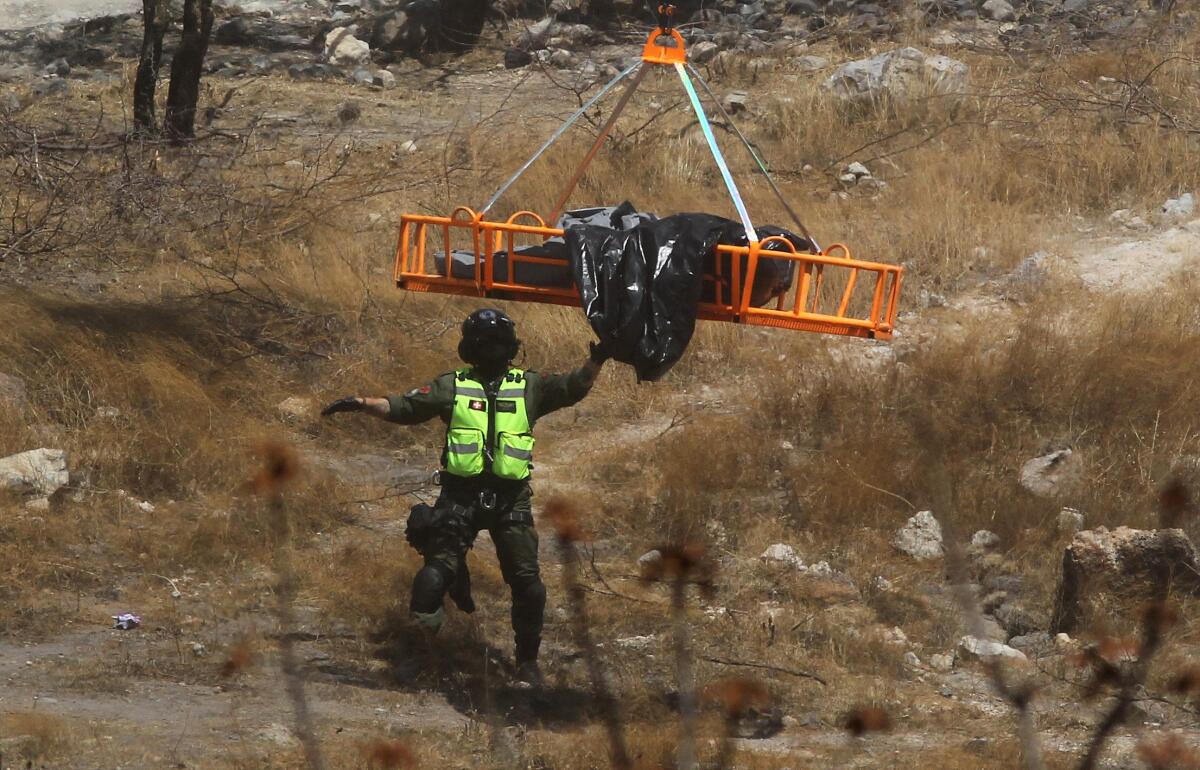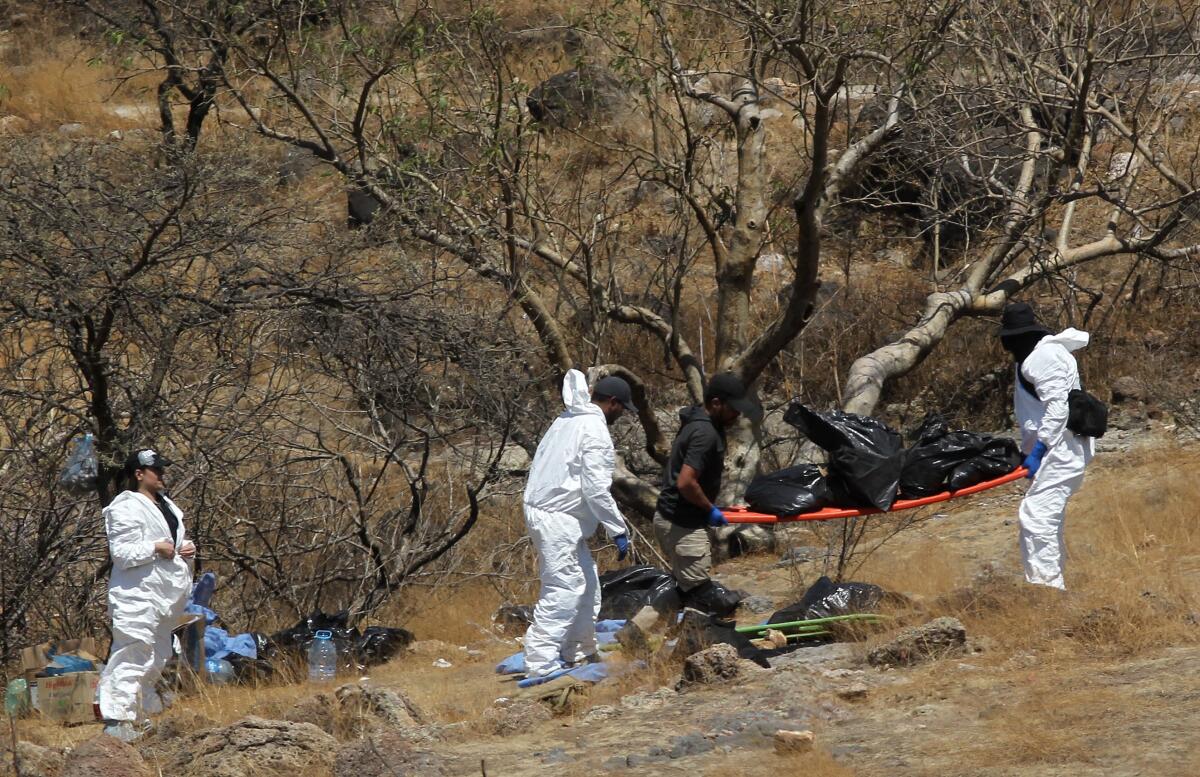Remains found near Guadalajara were of workers who tried to quit drug cartel call center

MEXICO CITY — Human remains discovered in dozens of bags in Mexico last week belonged to as many as eight young workers who had apparently tried to quit their jobs at a call center run by a violent drug cartel that targeted Americans in a real estate scam, U.S. and Mexican officials said Tuesday.
The officials confirmed the brutal story that began late last month when relatives reported the young people missing after they did not return from work in an office near the western city of Guadalajara. Suspicions and fears rose last week when heaps of hacked-up body parts were found in plastic bags.
Forensic examiners in the western state of Jalisco said in a statement Monday that tests had confirmed that the bodies belonged to the missing call center workers.
Six men and two women were reported missing between May 20 and May 22, but the forensic examiners did not mention the number of confirmed identities. There had been doubts about whether one of those reported missing was among the bodies found.
While the families believed their children worked at a normal call center, the office was in fact run by the Jalisco New Generation cartel, Mexico’s most violent gang, officials said. The cartel has branched out beyond its traditional activities of drug-trafficking, extortion and kidnapping.
Officials confirmed that the cartel now operates call centers that swindle Americans and Canadians through fake offers to buy their timeshares.
A San Diego federal judge recently sentenced two associates of Nemesio “El Mencho” Oseguera Cervantes, leader of CJNG, a newly dominant force in Tijuana.
Jalisco officials did not offer a motive in the killings of the workers, all but two of whom were under 30. But a U.S. official speaking on condition of anonymity because he was not authorized to speak publicly on the issue said it appeared that the youths were killed by the Jalisco cartel after they tried to quit their jobs.
“Best guess is these kids had decided they wanted out of the business,” the official said, adding that the cartel was “sending a message to other defectors.”
The Jalisco cartel, which is known by its Spanish initials CJNG, is infamous for its ruthless treatment of perceived traitors or informants.
For those who have worked for the cartel, knowingly or unknowingly, it appears to be an unwritten rule that the only way out of the gang is death or prison.
It’s not just drugs. Mexico’s cartels are fighting over avocados.
An activist group for families of the disappeared, Por Amor a Ellxs — roughly, “For Love of Them” — said there were about 15,000 missing people in Jalisco, out of a total of about 112,000 nationwide.
Call centers are a major source of employment in Mexico for young people or migrants who may have learned English in the United States but who have returned to Mexico.
The timeshare fraud came to light in April, when the U.S. Treasury Department announced sanctions against members or associates of Jalisco New Generation who apparently ran a similar operation in the coastal resort of Puerto Vallarta, also in Jalisco state, the gang’s home turf.
Brian E. Nelson, the U.S. undersecretary of the Treasury for terrorism and financial intelligence, said in a statement in April that the “CJNG’s deep involvement in timeshare fraud in the Puerto Vallarta area and elsewhere, which often targets elderly U.S. citizens and can defraud victims of their life savings, is an important revenue stream supporting the group’s overall criminal enterprise.”

The scammers contacted people seeking to sell timeshares in Puerto Vallarta properties.
In a 2023 alert, the FBI said sellers were contacted via email by scammers who said that they had a buyer lined up but that the seller needed to pay taxes or other fees before the deal could go through. Apparently, once the money was paid, the deals evaporated.
The FBI report said that in 2022, the agency’s Internet Crime Complaint Center “received over 600 complaints with losses of approximately $39.6 million from victims contacted by scammers regarding timeshares owned in Mexico.”
Ryan Donner, a broker at Ryan Donner & Associates, a real estate firm in Puerto Vallarta, said his firm had been asked for assistance by two people over the last two years who were apparently targeted by the scam.
Breaking News
Get breaking news, investigations, analysis and more signature journalism from the Los Angeles Times in your inbox.
You may occasionally receive promotional content from the Los Angeles Times.
“It’s infrequent, but yes, we have had it happen,” said Donner, who was able to steer both people away from the scam before they paid any money.
Donner described the fraud as very sophisticated.
He said the scammers sent prospective sellers fake contracts and official-looking documents from the Mexican tax authority apparently saying taxes were due on the prospective sale.
“They have contracts; they have documents that appear to be official documents. It would be very easy to fall into the trap of paying them,” Donner said.
“If a company contacts someone to say that they have a buyer for a property and all they need is money, that is a huge red flag for it being some sort of scam,” Donner said. “That’s not how companies usually work.”
More to Read
Sign up for Essential California
The most important California stories and recommendations in your inbox every morning.
You may occasionally receive promotional content from the Los Angeles Times.












